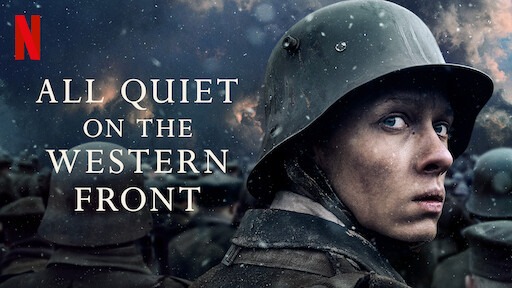I’m picky about war novels and movies (don’t even get me started about sentimental or manipulative Holocaust stories). But when I watched All Quiet on the Western Front last week, I was emotionally moved and intellectually gratified. After the final credits rolled, I wasn’t ready to let the movie go—which is exactly what director Edward Berger hoped for.
In an interview, he modestly reflected that some people will pause and feel the weight of wartime horror and guilt for a minute, an hour, or at most overnight. “Then eventually life hits and you forget everything. You go back to your life. It’s a movie.”
Well, I’m still appreciating the movie you made, Mr. Berger.
I keep thinking about all the ways the movie excelled, from the incredible acting to the startling sound choices (cue that strange harmonium distortion) and the use of individual treasured objects, like a woman’s perfumed scarf, as a way of helping us differentiate the soldiers and understand their particular yearnings.
I’m still appreciating the strategic balance between dramatic battle scenes and lighter moments—think of the scene where two main characters are “sitting on the shitter,” in the middle of a field—while one soldier reads a touching letter to his illiterate friend. What a clear lesson in tonal variation. (Can we apply those lessons to our works-in-progress? Of course!)
The film has garnered nine Oscar nominations, but it has also sparked criticism, as just about any popular movie or book will do. Some reviewers quibble that the opening, during which uniforms are removed from corpses, cleaned and fixed for redistribution to the next batch of doomed soldiers, doesn’t belong in the movie because it didn’t appear in the book.
Others take aim at particular characters. One German reviewer claimed that 17-year-old Paul Baumer was depicted as “a simpleton, a fool, who still hasn’t realised by the end what is happening on the battle fields of Flanders.”
In my mind, Baumer was a realistically naïve young man who starts learning about the futility of war immediately. The fact that he can’t extricate himself from the slaughter, much as he’d like to, is the story’s point. Were we watching the same movie?
Let’s be clear. The film currently has a 92 critic/90 audience score on Rotten Tomatoes. I doubt that Berger and his team are losing sleep over minority opinions.
Let’s also be clear that it can be stimulating to compare a film to the original book as well as the history behind it. This latest All Quiet on the Western Front cuts some scenes (like Baumer’s furlough trip home) and invents a big and especially futile battle toward the end, all in the process of delivering its message, as well as signaling how one big war set the stage for the next one. Maybe you think that was the wrong choice. Fine.
Getting a movie produced and distributed is a miracle in itself, requiring a ridiculous amount of money, faith, and collaboration.
Imagine making a film like “All Quiet…” and reading that some top reviewer, who has never written a script or made a movie in his life, didn’t care for a single one of your characters.
Imagine making “Woman King”—another of last year’s jaw-dropping productions—and getting snubbed by the Oscars altogether. (No nomination for Viola Davis? She was amazing!)
Granted, we don’t have to read about movie snubs and drubbings to realize the truth of the old saying, “You can’t please all of the people all of the time.” Just look up reviews of books now accepted as classics and you’ll find snark, nitpicking, ignorance, and worse.
Mary McCarthy, reviewing Margaret Atwood’s Handmaid’s Tale in the New York Times, called it “unpardonable” and “powerless.”
Oh, Mary.
We all have our opinions. Some of mine include:
Movie adaptations can’t and shouldn’t be direct copies of books.
People will always disagree about small details of history and, even more, of memory.
Anything startling and new will be misread and misunderstood at first by some audience members.
And most of all: making anything takes bravery.
The moment you begin to create a story that will be shared with an audience, however small, you are opening yourself up to criticism, both the dumb kind and the valid kind.
How does that feel? Frightening? Neutral? Stimulating?
I long ago made peace with mixed reviews for my books, or I thought I had. But my own reaction to the latest Oscar snubbing and snarking tells me I need to review some basic principles. One simply has to learn how to deal with criticism in all its forms, from the fair to the unfair, the actual to the anticipatory, the external to the internal.
These are muscles to be exercised, and I propose that Oscars season is a good time to notice how criticism operates on other creators. Let your indignation flare on their behalf, certainly. Indignation can be energizing!
But also notice how a drubbing or snubbing doesn’t in any way negate the brilliance or defeat the determination of the directors, cinematographers, actors, musicians, and other creators that you admire. Most of them will continue to make art. Even while the awards music plays, they are already busy doing the next thing. They are reading scripts, writing scripts, trying to figure out how the finagle the financing and pay the bills.
They are doing the work.
I hope you will, too.
Andromeda Romano-Lax’s sixth novel, THE DEEPEST LAKE, a thriller set in Guatemala, will be published in 2024. In the meanwhile, she is working on the next one. She is also a book coach who works with novelists and memoirists to shape full manuscripts into polished works ready for submission. www.romanolax.com.


I really appreciate this, Andromeda. I’m looking forward to seeing the movie, especially in light of my own project. Thank you for this!
“Making anything takes bravery.”
So much truth in that simple sentence. Thank you.